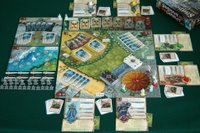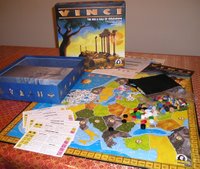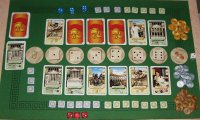
How many times do you have the conversation? For me, it invariably devolves into what seems like a Monopoly-bashing discussion. I thought I'd write it up once and for all so I could just give people a link.
So you play games?Yes.
Like Monopoly?Uh, not exactly.
Well, what then?Let me start from the beginning...
There are well over 3000 board games.
Pause for this to sink in. They are all registered on a website called BoardGameGeek.
Pause for giggles. This site has over 100,000 members, several thousand of whom are very active.
Pause for this to sink in. Members rate games from 1 to 10. At any given time, you can see all the games sorted by rank.
Where is Monopoly?About 20 from the bottom.
What?! Lots of people play Monopoly. It's one of the most popular games ever!Two things. One, popularity does not equate to quality. And two, active board gamers demand more from their games than Monopoly can provide.
Who says this rank is meaningful?It's only as meaningful as the members of the site make it. Anyone who is going to go to the trouble of registering to become a member, minimally, has some question they want to ask about a game. Many registered members play 10 or more games a week, and have 100 or more games in their collections. People who have played many different games tend to be more discerning. It's not unlike wine.
You mean they are snobs.Not at all. If you take the time to understand anything in detail, you will learn more about what you do like and what you do not like. You will learn to classify the
kinds of things you tend to like. You will even find yourself re-evaluating things you previously liked. This leads to a greater enjoyment and appreciation of the thing.
You won't always get agreement even among "experts", but some games work their way to the top and others to the bottom.
You only play games that are rated high?Well, you have cause and effect backwards. The games I tend to like are rated fairly high. However, I recently purchased a game ranked 1272--almost half way down the list. I let the opinions of others inform me, but not control me.
Ok, so explain why everyone hates Monopoly.That is a bit of an over-statement. Of the 2971 ratings, 35 are 10's. For any game, you will always find those who love it. As for why it is not one of the top games, that's rather complicated.
One of the biggest dislikes among gamers are games with very little choice. In Monopoly, you roll dice to determine where your playing piece lands. Your fate at the destination is based on luck rather than on your choices.
How else would you do it?That's partly the point. The designs of the top-rated games do not call for "roll and move" at all. In fact, you will rarely find a sequential track of connected spaces, except for keeping score.
So how do good games work?There's no formula for a good game, but there are many common mechanics. For example: auction, negotiation, connectivity, area influence, role selection, action points, tile placement, etc. It's not important to understand what these mean at this point. It's just important to realize that the kinds of games you have been exposed to may have given you a very limited perspective on gaming.
I suspect if I were to explain to you how any of the top 20 games work, you would be surprised at how interesting they sounded, and that it would be completely beyond your experience.
So where do I start?There's a different path for everyone. Think of all the games you already know. What do you like about them? What do you dislike about them? You may not even know the answers to these questions yet. When you are exposed to more and more games, you will be better able to define these things. Let's just say, for example, that the only game you know is Monopoly. What do you like about it?
I like collecting the properties.That is called set collection. In Monopoly, it's important to get all the properties of a single color. I might recommend Ticket to Ride or Ra.
I like improving properties with houses and hotels.There are lots of games with building actions: Settlers of Catan, Caylus, and Power Grid.
I like bidding on the properties that players choose not to buy.There are lots of games with auctions: Princes of Florence, Goa, and Modern Art.
I like making deals with players to trade properties and money.There are lots of games with negotiation: Twilight Imperium 3, Traders of Genoa, and Bohnanza.
Have you played any other games?
Risk.What do you like about Risk?
I like planning what I want to control and trying to take it over.There are lots of games with strategy on a map: El Grande, Railroad Tycoon, and Maharaja.
I like attacking my opponents.There are lots of games with player conflict: Euphrates & Tigris, Memoir '44, and Vinci.
If there are so many games with the same kind of functions as Monopoly and Risk, what makes them rated so much higher?In Monopoly, you have no control over where you land, and hence the properties you can purchase. Your income is based on how fast you go around the board, and how many players land on your properties, which is again governed by chance. The game tends to play rather long, and players can be eliminated.
In Risk, it's more a matter of simplicity. Every territory, as well as every piece, is the same. The only difference from two battles anywhere on the board is the number of armies involved. And once again, players can be eliminated.
What sorts of game should I try first?I recommend that you check out Settlers of Catan, Ticket to Ride, Carcassonne, and Through the Desert. These are very well-liked games that are not complex and have a nice variety of mechanics. Once you decide what you like and perhaps do not like about them, it will be easier to recommend others.
Also, if you find the above games too easy for your tastes, there are many more complex games to try. In fact, I would go so far as to say there's a game for everyone, even if they claim not to like playing games at all.
Grab your spouse, your kids, a bag of pretzels, and come on over...
 While waiting for some exhaust work on my car, I walked over to my local FLGS. They were packing up inside; it had closed for good the day before. It was really no surprise to me.
While waiting for some exhaust work on my car, I walked over to my local FLGS. They were packing up inside; it had closed for good the day before. It was really no surprise to me.












